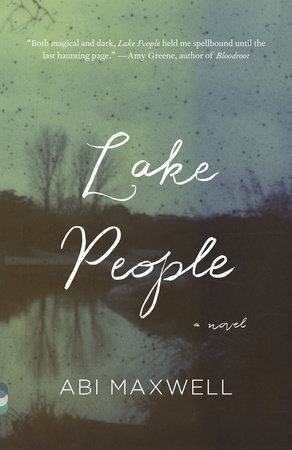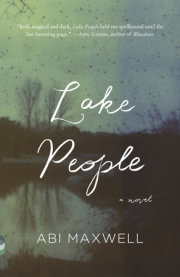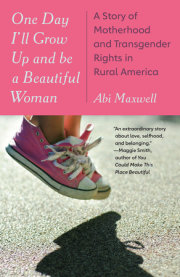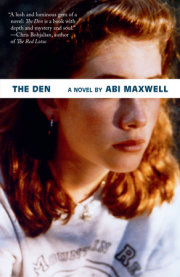My Heavenly Days
1910–-1962
my aunt signe kept a marvelous supply of canned goods. These she ordered from S.S. Pierce & Company, a place down in Boston. She simply called them up and placed her order, and in another week or so the cans were delivered to her doorstep. Immediately Signe dated those cans. She had a walk--in cupboard built in the kitchen, with a wooden pullout step at the base of the wall. The cans dated, Signe pulled out that step and stood upon it to sweep the older cans to the front and place the new ones at the back. In these years since her death, this is what I have said of her: that she kept a marvelous supply of canned goods; that she never did find a suitor; and that she remains the bright pivot of my life.
It was Signe who raised me. At night, when she tucked me into bed in our house at 36 Highland Street, she would tell me the story of our family. They came over in the boat, she would say, with water for their blood. In my bedroom, a lightbulb with a circular shade made of birch bark hung from the ceiling. It turned slowly in the breeze and sent shards of dim light around the room. That refracted light made it seem as though Aunt Signe and I were together under the lake. On weekends we would walk there, to the lake, and from the pier Signe would point across to Bear Island. “Sophie, we two come from out there,” she would say. “Your mother and father dropped beneath the ice and your grandmother turned wild on that wild island.” It was a sad story, yet because I had no memory of anyone in it, the story was beautiful. It was the legend of my very own being, and it made me know that I belonged in this place.
I always believed that Signe, too, belonged in Kettleborough, though now I sometimes think she may have been better suited for city life. When I was a girl, she liked to take the train down to Boston. There we would go to the old Swedish church, where they still held an evening service in what Signe called the old language. And there was a man there. His name was Hjalmar, and his family had been close to Aunt Signe’s father’s family back in Sweden. They didn’t say “Sweden,” however; they referred to that place by sending an unspecific wave over their shoulder. The motion said that their country was not in fact a place, but something tucked away into time. In that gone--by time, Hjalmar had made a living as a tailor, yet here in America he was destitute. Signe would bring him bread wrapped in wax paper, and always a savory pie.
After church we three would walk together, and I vividly remember one of those walks. Night had fallen, and big, heavenly snowflakes fell down upon us. There must have been streetlamps, yet to me it seemed the snow itself illuminated the world. Hjalmar was a tall man, and he walked between us, his elbows hooked into ours. I felt wonderful with his arm in mine, protected and involved. When we passed a homeless man on the street, Hjalmar stopped and removed his wool coat. He gave it one firm shake. A wave passed slowly through the wool, and, once it was clean of snowflakes, Hjalmar draped that coat over the cold man.
“Hjalmar, your coat,” my aunt said as we walked on.
“I can sew another,” he said.
“You can’t afford the wool for another,” Signe said. It was a reprimand.
“That’s right, too,” Hjalmar said. His voice held no concern.
“Will you ask him to live with us?” I asked Signe that night, on the train ride home. She seemed astonished by my question. Yet if Hjalmar couldn’t afford a coat, I didn’t understand how he could afford to live at all.
“Don’t you love him?” I asked. I must have said more. I knew that it was only when we traveled to see Hjalmar that Signe wore her pearl necklace and a bit of rouge on her cheeks. I must have made my meaning clear: Can’t he be a husband to you?
“I cannot love Hjalmar as a woman loves a man,” my aunt Signe said firmly. She kept her vision fixed on the dark night. I took her statement to mean that Hjalmar would not have her. And I understood to never suggest such a thing again.
My aunt was a teacher at the Kettleborough schoolhouse, and just across the street from that school, in the triangle made by the town’s three roads intersecting, sat the Kettleborough Memorial Library. It was small. But it was also wonderful, made of brick, the south side a wall of buttresses and stained glass. Through that glass the sun shone in singular strands. The rest of the library was dark and musty, like an old stone castle, so those rays of colored light were striking. Signe, who loved nothing more than to stand in the sun with her eyes closed, used to enter the library, run her eyes over the small place, then walk with purpose to the book upon which the light directly fell. In this way she would decide what next to read.
“They never led to anything, those books,” Signe said once, when I was grown. It wasn’t until then that I understood that she had been on a search.
After school, Signe would cross the street to that library to visit the librarian. I didn’t know the depth of their friendship, but it was clear to me that the librarian was my aunt’s only friend in the area. It was a love of fashion that initially drew the two women together. Both were expert seamstresses, and their drooped necklines and high, fitted waistbands made them stand out in our small town. Though my aunt preferred muted tones, the librarian draped herself in vibrant colors, which certainly matched her personality. She was a joyful, unabashed woman whose husband stayed home to raise the children.
Not long after I asked Signe if she loved Hjalmar, the librarian gave my aunt a book. Signe came to my room with it in her hand. I was fourteen, and not a prude in matters of love. I don’t know how Signe saw this, yet she was right; I had kissed and been groped by a few boys, and it was not something I felt any shame about. In fact, I enjoyed meeting boys in the dark of the boathouses that lined the lake. “This is my duty,” Signe said, and sat at the edge of my bed. Nervousness had splotched her neck. After placing the book on my lap, she stood. Her straight back faced me. Her head was tilted slightly upward, so that her long rope of sandy hair reached her hips. Her hands, hanging awkwardly at her sides, continuously clenched and released. It wasn’t the sort of motion my aunt typically made. She was a sure, firm woman.
“I know nothing of the subject,” she finally said. “I have no experience with it.” She kept pushing to make her meaning clear, though it certainly was to me. “None at all,” she said. “But I do not wish such a fate upon you.” When she left my room, Signe shut the door behind her. To shut a bedroom door was an action never taken in our small world.
Copyright © 2013 by Abi Maxwell. All rights reserved. No part of this excerpt may be reproduced or reprinted without permission in writing from the publisher.


































































































